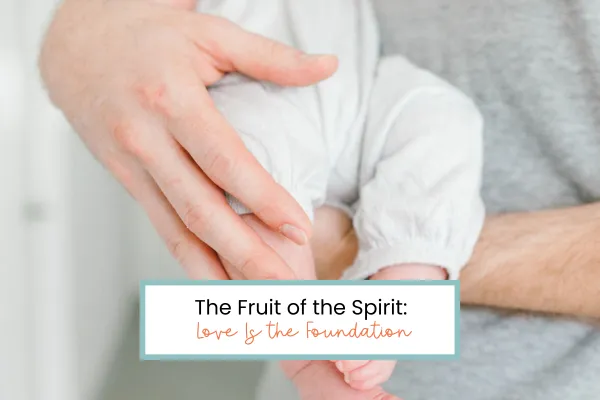

The Fruit of the Spirit: Love is the Foundation
"Charity suffereth long, and is kind…” (I Cor. 13:3a)
Have you ever noticed that when a person is filled with love, they also have patience and joy and the other fruit of the Spirit? Even though the fruit of the Spirit is described in different ways (i.e. the different fruit), love is the foundation.
If there’s no love, there can be no other fruit, either. It’s the foundation.
The concept of love is central to many religious and philosophical teachings, but it holds a particularly significant place in Christianity. In the New Testament, the Apostle Paul discusses love as a fundamental aspect of the Christian life.
This discussion is encapsulated in the famous passage from Galatians 5:22-23, where Paul lists the fruits of the Spirit. The first fruit he mentions is love.
But what does this love mean? Why did Paul emphasize it to the Galatians, and how can it manifest in our everyday lives?

Understanding Love as a Fruit of the Spirit
In Galatians 5:22-23, Paul writes, "But the fruit of the Spirit is love, joy, peace, long-suffering, gentleness, goodness, faith, meekness, and temperance. Against such there is no law."
Here, love is presented as the first and foremost fruit of the Spirit, indicating its paramount importance in the Christian life. The Greek word Paul uses for love is "agape," which refers to an unconditional, selfless, and sacrificial love.
This is the kind of love that God has for humanity, and it is the love that Christians are called to emulate.
Agape love goes beyond mere feelings of affection or attraction. It is a deliberate choice to act in the best interest of others, regardless of their actions or attitudes toward us.
Time out for a second. I want to explain that this doesn’t mean that you need to stay in a relationship with someone who is abusive or dangerous. (This could be a friendship or a marriage.)
The book of Proverbs talks about staying out of the path of someone who wants to harm you. It is not okay to allow yourself to be continuously exposed to abuse and harm. This particular topic needs its own blog post, but you can go here and here to learn more.
Back to the main topic. It is a love that seeks the highest good of others. This love is not based on emotions but on a commitment to the well-being of others. It is not based on what you can get from it. It's based on what you can give.

Paul's Message to the Galatians
Paul's letter to the Galatians addresses several key issues facing the early Christian community in Galatia. One of the primary concerns was the influence of Judaizers, who were insisting that Gentile Christians must adhere to Jewish laws, including circumcision, to be truly saved.
Paul strongly opposed this teaching, emphasizing that salvation comes through faith in Christ alone, not through the works of the law.
In this context, Paul's discussion of the fruit of the Spirit shows the ethical and moral transformation that comes from living by the Spirit, rather than by adhering to the law.
By listing love as the first fruit of the Spirit, he emphasizes its foundational role in the life of a believer.
Love, according to Paul, is the fulfillment of the law (Galatians 5:14), and it is through the Spirit that believers are empowered to love others genuinely and selflessly.

Examples of Love in Everyday Life
Understanding the theological and doctrinal importance of love is one thing, but how do we carry out in our everyday lives?
The first thing to remember is that we don’t try to make it happen. The Holy Spirit grows it in us as we are plugged in to him.
If we ignore him and try to have love on our own? It won’t work. It actually turns into the works of the flesh. (More on that topic in a different post.)
Having said that, here are three practical examples for love:
1. Loving Through Acts of Kindness
One of the most tangible ways to express love is through acts of kindness. This could be as simple as helping a neighbor with their groceries, volunteering at a local shelter, or offering a listening ear to a friend in need.
These acts, though seemingly small, reflect a heart that is tuned in to the needs of others and is willing to put their well-being above one's own convenience.
For instance, consider a busy professional who takes time out of their hectic schedule to visit an elderly neighbor who lives alone. This act of kindness, driven by genuine concern and love, can make a significant difference in the neighbor's life, providing companionship and a sense of being cared for.
2. Forgiving Others
Forgiveness is one of the most challenging expressions of love, yet it is a crucial aspect of agape love.
It means letting go of grudges, resentment, and the desire for revenge, even when one has been deeply hurt. It's a conscious decision to release the offender from the debt of their wrongdoing, just as God forgives us.
An everyday example of this could be seen in a workplace scenario where a colleague has unfairly taken credit for someone else's work. Instead of harboring bitterness or seeking retribution, the wronged individual chooses to forgive the colleague.
This act of forgiveness not only frees the individual from the burden of anger, but also opens the door for potential reconciliation and a healthier work environment.
3. Sacrificial Giving
Sacrificial giving is another powerful demonstration of agape love.
This means giving in a way that involves personal sacrifice. It could be financial support to someone in need, dedicating time to a cause despite having a busy schedule, or sharing one's skills and talents without expecting anything in return.
For example, a person might choose to donate a significant portion of their income to support a struggling family, even if it means cutting back on personal luxuries.
This kind of sacrificial giving mirrors the selfless nature of agape love and demonstrates a deep commitment to the well-being of others.
The fruit of the Spirit, as described by Paul in his letter to the Galatians, begins with love for a reason. Love, particularly agape love, is the foundation for all the other fruit.
It is a selfless, unconditional, and sacrificial love that reflects the character of God and transforms the lives of those who embrace it.
Paul's emphasis on love to the Galatians was not merely a theological statement, but a call to practical, everyday expressions. Through acts of kindness, forgiveness, and sacrificial giving, believers can embody the love that is the hallmark of a life led by the Spirit.
Of course, it’s not limited to the ideas I mentioned earlier. Our tendency is to create a list out of ideas and work to check them off. These are just ideas.
The most important thing is to talk to God about what he wants you to do. He may not want you to give a certain amount of money to a certain individual. He may want you to do something else.
This is where it truly is a walk with the Lord and choosing to be plugged in to His Spirit. This relationship is how it becomes a fruit of the Spirit. Not a fruit of the Christian.

